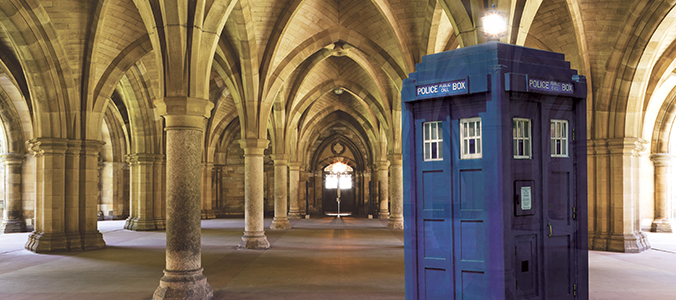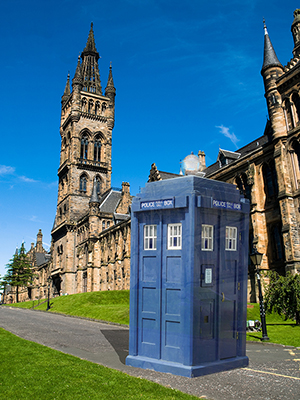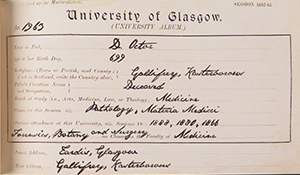Is the Doctor a graduate?
Known for his adventures travelling through time and space keeping us safe from evil monsters, the Doctor is one of the world’s most loved aliens. Amid claims he studied at Glasgow, Avenue investigates whether the TV Time Lord is our most famous fictional alumnus.

Avenue’s research into the time-travelling alien started with the biggest question eluding Doctor Who enthusiasts, known as Whovians, since the series began over 50 years ago: Who is the Doctor?
His life appears to be a fast-paced riddle, filled with half-told stories and wildly exciting tales – such as that he was once married to Marilyn Monroe and he has studied at Glasgow.
Over the years he has told conflicting stories about his doctorate, leaving Whovians questioning his qualifications. Then in the 2014 season finale, the Doctor’s companion, Clara Oswald, referred to his Glasgow degree.
While pretending to be the Doctor in an effort to save herself from an army of Cybermen, one of the planet’s deadliest enemies, in Death in Heaven, Clara said: ‘I don’t even really have a doctorate. Well Glasgow University, but then I accidentally graduated in the wrong century.’
Although this doesn’t fully solve the mystery of what he studied and when, it seems to confirm that he is a Glasgow graduate.
The current writer and producer of the series, Steven Moffat (MA 1983, DLitt 2013), is a Glasgow graduate. An enthusiastic fan of the show since childhood, Steven became head writer and executive producer in 2010 after several years writing for the show. It’s Steven who has been credited with the rise in success of Doctor Who.
But it was long before Steven worked on the show that the Doctor claimed he studied at the University. In 1967, the Second Doctor (played by Patrick Troughton), in the Moonbase series, said he had graduated in medicine at Glasgow in ‘1888, I think...Lister’.
Professor of Surgery Joseph Lister developed a revolutionary system of antiseptic surgery while at the University from 1860 to 1869. But this was over 15 years before the Doctor claimed to have been here.
The Fourth Doctor (played by Tom Baker) included Lister in his CV but dated the degree to 1880. And the Fifth Doctor (Peter Davidson) told American college student Peri Brown that he could be a doctor in the American Civil War because he had a degree from Glasgow.
When you delve a bit deeper you find he renounced claims to a degree, except a ‘purely honorary’ one, in the 1974–75 episode Robot, and contradictorily showed advanced medical knowledge in the The Trial of a Time Lord in 1986.
On several occasions, the Doctor has called himself a scientist as well as displaying great knowledge of the law. It seems he could simply be a ‘Doctor of many things’ as he stated in Revenge of the Cybermen in 1975.
University archivist and Whovian, Lesley Richmond, has a theory.
‘There are a few problems with the Doctor’s Glasgow claims,’ says Lesley. ‘Lister wasn’t here in the 1880s. And, when you look at the different dates he says he was here – it doesn’t add up.
‘One of my theories is that he came to consult with some of the greatest scientific minds of the time, because he was developing the sonic screwdriver. Now, who better to assist than Lord Kelvin?’
The sonic screwdriver is one of the Doctor’s sophisticated gadgets. It allows him to unlock anything and remotely control other devices. Lord Kelvin was Professor of Natural Philosophy from 1846 to 1899, which means the Doctor could have taken his classes in advanced mathematical physics as well as used his electrical engineering laboratory to develop the screwdriver.
Lord Kelvin could be one of many professors that the Doctor studied under. Clara’s recent revelations imply that the Doctor took a flexible approach to his studies. Being over 2,000 years old, spending his life jumping between civilisations to save the world, this is not surprising. He says he got a degree from the University of Glasgow, perhaps we have to take him at his word.
Doctor, who are you? This, it seems, is a question that no one, not even a Whovian, is destined to find the answer to.
Signs the Doctor has been on campus
 Around the city there are many signs pointing to the Doctor’s time in Glasgow. The biggest clue is his iconic time machine – TARDIS – which can be seen around the city, from the Botanic Gardens to Sauchiehall Street. For Lesley Richmond the Doctor's presence on campus could explain the absence of statues in the main building’s niches.
Around the city there are many signs pointing to the Doctor’s time in Glasgow. The biggest clue is his iconic time machine – TARDIS – which can be seen around the city, from the Botanic Gardens to Sauchiehall Street. For Lesley Richmond the Doctor's presence on campus could explain the absence of statues in the main building’s niches.
‘For years, people have asked me: Why are all the niches on the main building without any statues?’ she says. ‘The original plans for the Bute Hall, for instance, did have statues. When the people in the 1880s saw statues in the niches, they would have thought it was quite natural to have them there, but when the Doctor arrived he realised it was a major infestation of Weeping Angels, so he got rid of them.’
Given that weeping angels – beautiful stone killers that can only move when there’s no one looking at them – consume all of a person's potential life, you will be glad to hear this.
This article was first published in December 2014.

Uncovered evidence: University archivists found an intriguing matriculation record which supports claims that the Doctor studied at the University.

